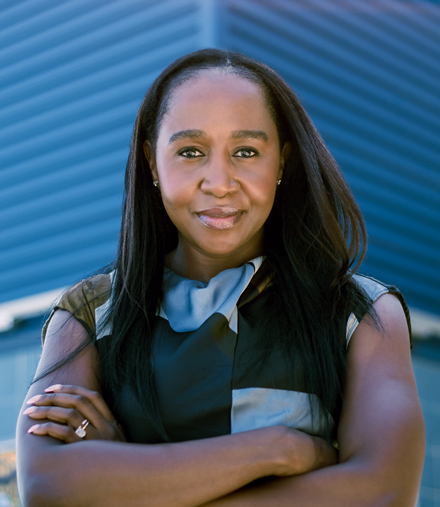The Risks and Rewards of Being a Leader Brand
Most brands want to become a market leader. But what does it mean to be a leader brand, and what does it take to maintain that position? In this episode of the podcast, Chris, Bo, Charity and Cynthia delve into the unique challenges and advantages of being a leader brand. Explore the strategic risks of leading the market with your brand and the benefits it provides to brands that can innovate and grow.
This transcript has been edited for clarity and readability.
Table of Contents
- What is a leader brand?
- What are the benefits of being a leader brand?
- What is challenging about being a leader brand?
- Why is trust important to a leader brand?
- Should every brand try to be a leader brand?
What is a leader brand?
Chris Wilks: Hey, guys, thanks for joining today. So let's dive right in. When we say, leader brand, what does that mean? What makes a brand a leader in the market?
Charity Ndisengei: So ordinarily, when you talk about a leader brand, it's a brand that has a significant amount of share in the market. So it has a profound effect on customer perceptions and sets the pace for the industry and its innovation. They spend a lot of money on R&D as well.
Leader brands stay ahead and set the pace for that industry as a whole, not just the product. It has incredible brand trust and credibility. So customers look to it to see what's happening within the industry. It's a brand that they really look up to, that they want to have as a partner and buy. It's a brand they actually support with their money. It's a scalable brand. And it's really good at adapting.
So it's adaptable in the sense that it stays on top of what's happening from a trend perspective and adapts accordingly.
Bo Bothe: One thing I think we're seeing a lot is that transition. Whether we have a different brand archetype, you’re a challenger brand, or something different.
There can be leaders of brands that don't have the most market share, but they're working their way toward it. And I think that that's been an interesting thing that we've been talking about as we've been preparing for this podcast. That transition is starting to happen faster. There are challenges quicker.
Tesla, I think, is a great example of that, where Tesla is pretty darn new, and they are being challenged really quickly after they created a space. They weren't the only brand in that space to create it and to start.
But, man, they quickly have competitors that are grabbing significant market share a lot faster than you would have seen in an industrial realm in the past.
So I think there's a piece of speed to this that leader brands probably haven't had to deal with in the past that they're having to deal with today.
Chris: It seems like challenger brands are kind of consistently coming for leader brands. Right? It's not just the speed but also the volume at which you have to stave off competitors.
Being adaptive, understanding how rapidly things are changing will set you apart or allow you to continue to be that leader brand. If you do it properly as a challenger brand, eventually you become a leader.
And then, you know, reciprocally you could fall back. You once were a leader brand. But now you are a challenger brand, or maybe worse. Maybe you're deteriorating, or something of that nature.
Cynthia Stipeche: For those brands who hold that top position, you can't sit there and rest on your laurels. There's so many things that are happening in the marketplace right now that it could have the potential of leveling the playing field.
For those organizations that have really strong core brand values and understand who they are, and have buy-in from the inside out on their brand, it puts them in a better position.
Chris: I think that gives you a leg up when you're trying to establish a leadership kind of position or trying to really carve out your place in the market. If everybody's rolling in the same direction.
We talk about it all the time: If you live your core values it really does make things easier. There's no hesitation. You understand what the mission is, and what the goal is. And getting to that position that you want, which in this case is being a leader brand, would be a lot easier.
What are the benefits of being a leader brand?
Chris: Can you guys tell me a little bit about the tangible benefits of being a leader brand? Why would you want to be a leader brand?
Charity: Well, market influence is one thing, your ability to actually influence what this industry looks like and what comes next. Another big thing is, you have the ability to dictate what the pricing is. So the pricing power is one of the benefits.
And speaking of talent and understanding your values and living your values: The ability to attract top talent is absolutely key. I mean, if you're a leader brand, by and large, you are on someone's bucket list of where they want to work. So you're able to pick off that key talent really, quickly and really easily. People are fighting to be in your business.
Bo: The stock price is definitely affected by that perceived value. You can see it across different brands. There was a significant difference in pricing when Google and Samsung each came out with their phones. But now they're all priced right around the same place. But their market share is completely different. Their market capitalization and their stock price is completely different.
A lot is due to the perception, you know. Then, the ability to command pricing like Charity said is critical. Customer loyalty too. There is an affinity that happens beyond just loyalty for leader brands in the market that gets people to buy more of their stuff at higher prices. We've talked about that from an intent of branding and then, you know, Charity talked about market share.
I think that's one thing that people don't think of as characteristics of a leader brand. There's a growth opportunity that comes with being that brand that can introduce something new. Where you can start to innovate and change just because you have so much capital and you have so much influence and perceived value that you can try something that wouldn't normally be tried.
Charity: Thinking about where we are from a market perspective as well: we're going through a bit of a tough time from an economic perspective right now. So pricing elasticity, the ability to bounce back in hard times as brands is extremely valuable.
People use brands as badges, as you know, and when my dollars are a little tight, I stick to the brands that I know that are going to deliver 100 percent of the time. So that's another thing that the robustness of your brand is: something that gives you staying power in difficult times like now.
Bo: One study we saw said that the difference in share can be 9 times between a leader brand to a follower brand. I mean, that's pretty significant to where I feel like I have to buy from this brand.
Southwest used to be one of the top brands in customer service and all that, and their brand is now number 10. Alaska Airlines is somehow unseated as as one of the best consumer experiences. You wouldn't have seen that kind of movement so quickly and so much up and down as you do today. And so that's made it really interesting to kind of see that shift in leader brands, too, and different perceived categories of branding.
Cynthia: That's a great example where the landscape is shifting. And for those challenger brands there's those key opportunities where they can sweep in and overtake maybe part of that if they're prepared for it, which goes back to preparation and being able to jump in and get in there. If you see that opening in the marketplace.
What is challenging about being a leader brand?
Chris: The amount of risk that you are expected to take to try to innovate adapt to to forge ahead. Would you guys say, that's a risk of being a leader brand, or is it one of the benefits?
Charity: It's really a risk, because the pressure is on these leader brands to innovate and to spend lots of money on research and development and fending off the competitors. Sometimes it diverts resources away from other strategic initiatives, because you need to stay on top of that innovation curve and research and development. So I think it's an absolute risk of being a leader brand.
Look at Apple every time that they release a new watch. It's under such scrutiny, and they make massive, massive events of these new releases because they are expected to release something amazing every single time they update a phone. It's a massive risk. It's either a hit or it's a real miss across the industry, whether you follow or you're gonna get a new phone or not. It's something you talk about.
Cynthia: I think another good example is like Google. It's synonymous with leading technology and innovation. But think about all the products that Google's released in the past decades.
Whether it's like the Google Glass, or you know, a million other products back in the day. There was a social media network they had at one point. It kind of fell by the wayside. I think tech is a bit more forgiving in that the goal is to kind of push the needle and try to experiment to put new things out there.
But for some other brands it might be a little too adventurous for certain consumer brands, maybe some stuff with vehicles or safety products where you know what you want. For example, I like my toothpaste. Just leave it alone.
Bo: You have a target on your back when you're a leader brand, too. It's like being the best team in a certain league: everybody's got to be the best, especially your peers, and there is a benefit and a curse that comes with that.
Keeping up with that leading position is a challenge. I think some of the market shifts that you may need to make are a challenge, too. Google is probably synonymous with search, but becoming synonymous with email and Drive and other services took some work, much like Amazon was synonymous with books originally, and it took a lot of time for them to move into, “We are the place you can get anything.”But when they were able to do it because they were a leader brand, they were able to make that transition like we talked about earlier.
So I think that's one of the challenges of a leader brand: you can kind of get pigeonholed. It's really hard to capture the full value of all the big things you're doing, because people just see you as what you started as.
It’s almost like having your first job. This is that kid from college, and you're 5 years in, and people still treat you like that kid from college. It's that same thing that follows you. In this leader brand position where you started somewhere notable, it's hard for people to see you in a new way.
Cynthia: I think within organizations there might also be a little bit of the “if it's not broken, you don't have to fix it” mentality. But you need to always look out and evolve.
I think another thing, too, is getting too complacent in a leadership position where you might not see a need to communicate with your audience. But you do. You need to stay on top of that.
Charity: Another thing to consider is regulatory scrutiny. Because you are so big, you're more likely to have people look at you from a regulatory perspective. They face more scrutiny because they have so much market influence. So the government's constantly looking at them.
Various government entities will start asking, “are they influencing the industry unfairly?” “Are they a monopoly?” So there's always that scrutiny.
And then, of course, because you set the bar, people tend to be harder on you. A misstep by a leader brand is much more pronounced than a little brand or a little challenger brand, and it's more likely to be looked at and really scrutinized.
Chris: It's almost like a double standard. You're expected to innovate and push boundaries and do things. But if you take a step a little bit over that line, then…
Charity: You'll know about it.
Chris: Regulatory bodies will chomp at the bit to hold you accountable, and make an example of you in some cases.
Why is trust important to a leader brand?
Chris: How important is trust to a brand leader position?
Bo: I think it's huge. I mean, in any branding situation, trust is critical. As we’ve all been talking about, you gotta deliver. For leader brands, you know there is a high expectation of delivery.
And you know, I've talked about this in some of the other podcasts. Apple's products are not nearly as user friendly as they used to be. And in the past, they were almost bulletproof, usability-wise, right? The button was always in the right space. The thing was always where you wanted your finger to be, you know, on the screen.
But that's not the case anymore. I think I've told this story: You know, constantly calling the emergency number on accent. I'm SOS-ing my phone because they just moved that thing to the top, and now I do it all the time. So I'm either used to the product a certain way, or they kind of made a misstep.
Now, I'm willing to give them a handful of missteps after literally 30 years of brand loyalty. But if I'm 5 years into my brand loyalty, and they're still not delivering, I'm probably more willing to switch.
And in today's world where it's hyper competitive, breaking trust is brutal for brands. Everything else is so accessible today that the switching cost is super easy, so leader brands can lose their position pretty quickly. Compared to what they were before.
I don't know what you guys think about that, but I think that trust is a huge component of any branding initiative, but especially a leader brand, because you have such high expectations, and you're paying a premium.
Chris: When you guys talked about it earlier, I wrote down a quote: “The best way to predict the future is to create it.” And I think Leader Brands have to operate in that realm. So you have to have that trust. You have to have a little bit of insulation to take risks. Not everything is gonna work out a hundred percent of the time. But you have to build up that equity.
Charity: I think it's even more imperative for leader brands because they set the pace for the industry. So if there is a breach of trust. It's not just about that brand. It's about the industry as a whole.
I think a really key example of that is Meta and the way that they used to use customer information and how that's affected that entire industry from a social media perspective, along with third party cookies.
Another one that really stands out for me is Volkswagen. They used to be one of the best producers of diesel engines. And then there were major issues around the way they were testing emissions from diesel cars.
Basically because of that, diesel cars kind of went out of fashion. No one trusted them from the time that that issue came about in 2015. It didn’t just affect Volkswagen, it affected most Diesel cars across the globe.
So there is a disproportionate amount of waiting on trust with leader brands, cause it's not just them that's affected. It’s everyone in that industry.
Bo: Yeah, there's such a pressure that they own so much of the mind share beyond just the market, that when there is an issue it affects the whole market. I mean, you saw that in banking, with a handful of banks. That whole industry of local banks was destroyed, you know, because a couple of them made bad decisions.
Charity: That's bubbled over to different industries as well cause I remember that it didn't just affect banking. I started my MBA just after that happened. And there were these big pages that global business schools had to sign off on because MBAs were the ones who were making these decisions with the banks. And we had to sign this. That we’ll be ethical business leaders going forward because of what had just happened. So it spilled over to other industries, too.
Should every brand try to be a leader brand?
Chris: Should every brand strive to be a leader brand? Does that make sense for every brand? It sounds good in theory, right? But is it? Is it in practice?
Cynthia: I think it depends on what your organization is all about. I think for some they might have a niche, and it makes sense for them to kind of work within that niche, but you have to make the determination to become a leader.
Brand is something that you have to invest in. It's just not a financial investment. But it's an investment in your belief system and who you are and how you approach business and who you hire.
And how do you engage your audience? How do you become a partner, or sell a product that people will adopt and maintain? There's a serious amount of investment that goes into becoming a leader brand that maybe not all organizations are prepared to invest in.
Bo: I think the reality is, unless you're driven to establish high expectations, to massive quality of product, to incredible customer service, to, you know, innovation, always thinking, and improvement, I don't think everybody should be. I know everybody can't be.
They could aspire to one component of a leader brand. But, man, it is hard. I I think there's a level of commitment that comes to this where you just have to see whether your company and your vision aligns with that.
Chris: I think it's a “be careful what you wish for” kind of thing, right? You can have aspirations. But in reality, there's more that comes with that. Heavy is the head that wears the crown.
The first place that I would start is, does my audience care? Do I just wanna be the biggest? Or do I wanna have the biggest market share? Why do I want that? Does my industry value this? Or is it so commoditized to your point where you’re saying hey, as long as I'm doing well in what I'm providing, maybe that's enough.
Cynthia: Which again goes back to: What's the long-term vision for the organization? Does that align with it?
Charity: There are some businesses out there that are going to be phenomenal businesses by being the dominant player in a niche market. That doesn't mean you have the largest market share, but that's a strategic move that the business could choose to have.
Then there's some brands that will do phenomenally well by partnering with the leader brands, but never really wanting to be the market leader. It really depends on what business strategy you're wanting to take advantage of.
Chris: And if you are striving for that mark it probably behooves you to to consider and ask yourself, first, what are the resources that are gonna be required to to maintain this position? And of course, do we have those resources?
And not just not just from a financial standpoint. We talked a couple of times here about the R&D side of things: do I have an R&D department? It depends on the industry. But do I have a viable enough R&D team to be able to kinda sustain this thing once I get there? You can get to the top, you can make a plan. But then you have to continue innovating.
You have to continue taking risks, and if your brand is not comfortable with that, you might have bitten off more than you could chew.
Cynthia: You have to invest in hiring the right people, and then also getting everybody stepping in line with the brand values and strategy. It's a kind of a collective goal, right? Everybody is marching towards that. So you have to have that internal buy in.
Charity: And then there's market dynamics as well. I mean, you could want to be the market leader. But if it's a really established market that's been around for years, trying to get there is going to be incredibly difficult.






